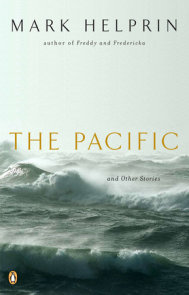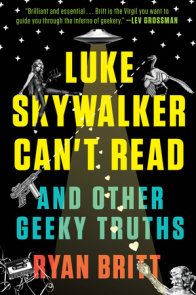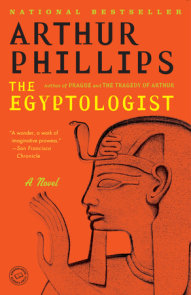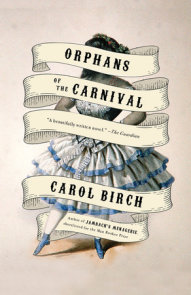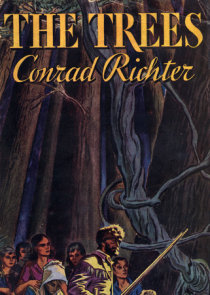READERS GUIDE
Questions and Topics for Discussion
“I was born to be a king, and you were born not to have one. America does not need and cannot have a king, for it is majestic in itself as almost no other country has ever been… Its greatest majesty, its gift to the world, is that it has carried out God’s will to make each man a king, subservient only to Him.” –Freddy and Fredericka, p. 499
INTRODUCTION
Freddy and Fredericka starts off as satire–a broad send-up of Prince Charles, Princess Diana, and their very public travails. His eccentricities, maladroit pronouncements, and talking to “plahnts,” her preening and empty-headed posturing, and the media’s gleeful pursuit are all fodder for Helprin’s slapstick wit. Fredericka makes a bizarre speech about Samuel Pepys and Australian aborigines and receives accolades from the press; Freddy wanders through a village, “accidentally” screaming obscenities, and winds up tarred, feathered, and photographed outside Windsor Palace. Though we are vastly amused, the queen is not. Something must be done–and that something leads Freddy and Fredericka beyond satire and into the realm of fairy tale.
There is more to Helprin’s rollicking alternative universe than mere caricature–it is a mythic dimension of kingship-deciding falcons, kingship-saving wizards, and kingship-reviving quests. Mr. Neil (an anagram for Merlin) is summoned to sort out the Freddy and Fredericka mess, and his directions (supported by Parliament, press, and queen) are clear: the royal couple must parachute into New Jersey, make their way anonymously through the United States, and recapture the former colonies for Britain.
And so Freddy and Fredericka begin a hilarious, picaresque ramble across America. They lose their teeth, masquerade as Jamaicans, and sleep on the streets. They encounter a vicious motorcycle gang, a Gypsy car thief, tasteless art collectors, and a psychiatrist. They work as janitors, dishwashers, fake medieval serfs, wilderness firefighters, and dentists. They cruise down the highway, jump freights, and float in a barge down the wide and languorous Mississippi. And through it all, lo and behold, Freddy and Fredericka change. They come to enjoy hard work and honest wages. Freddy comes to appreciate Fredericka’s innate intelligence, and Fredericka comes to admire Freddy’s resourcefulness and sense of duty. They fall deeply in love, and contemplate never returning to England.
A chance encounter with a buffoonish American presidential candidate, however, leads them back to their quest. Equipped with Freddy’s stirring words and savoir faire, the bumbling Senator Dewey Knott goes from presidential zero to national hero. And when an assassin strikes during the Republican National Convention, Freddy is perfectly positioned to ride a wave of popular sentiment–and retake the wayward colonies. But Freddy chooses not to. America, he says, is a country that makes “each man a king”–a country that does not need him. Britain, on the other hand, still does, and he and Fredericka return, though for some reason everyone seems to think they’ve only been on a trip to “Pahkistahn.” We, however, know differently. Freddy and Fredericka are a changed couple, and Freddy is ready now to bear his mother’s death, shoulder his responsibilities, and pass the falcon’s test. That is, he is ready to be king.
ABOUT MARK HELPRIN
MARK HELPRIN was educated at Harvard, Princeton, and Oxford, and served in the Israeli army, Israeli air force, and British merchant navy. He is the author of A Dove of the East and Other Stories, Refiner’s Fire, Ellis Island and Other Stories, Winter’s Tale, A Soldier of the Great War, Memoir from Antproof Case, and The Pacific and Other Stories.
A CONVERSATION WITH MARK HELPRIN
How did you come to write Freddy and Fredericka?
On the three-month, million-city 1991 book tour for A Soldier of the Great War, I was accompanied by my wife and two very young daughters still in car seats. (Of course we all sat in car seats, but the children sat in special children’s car seats that are imprecisely named.) The children had become aware of Charles and Diana via television news, although they were not old enough fully to understand the context. Somewhere in America we found ourselves at dinner in a restaurant that had a glass window through which the diners could watch a large staff at work in a frenetic kitchen. Clearly visible were a man and a woman, white caps on their heads, dutifully clearing dishes and feeding them into a giant dishwasher. After observing them for quite a long time, one of my children turned to me and asked if these were the Prince and Princess of Wales. Immediately I thought that if they had been, it would be a story that I would love to hear or tell, not least because I have always loved the idea of high personages going incognito– for what it shows about them, us, and the humanity we share, and because it’s so entertaining.
Freddy and Fredericka is something of a departure for you. What themes and concerns connect it with your previous books?
It’s a departure only in that, unlike my intention in previous books, the comedy is here sustained almost until the end. (All comedies tend to end either seriously or in chaos, and by temperament if not design I chose the former.) If Shakespeare thought comedy worthwhile, that means the rest of us can take a break from tragedy now and then without betraying our calling, even if the modern professional intellectual, a poseur by nature, has yet to discover this. Each of my books is different, I hope, and the critics confirm this happily and sometimes unhappily (although in the latter case it’s always because their wives have just left them and they’ve become dope addicts), but as different as they may be they’re interconnected by strong bonds. Rather than be my own critic, which by decency is forbidden, I’ll just point out that the motto of my first book, and by implication all that follow, is “Amor mi mosse, che mi fa parlare,” which is from the second Canto of Inferno, and means, “Love moved me, and makes me speak.” Briefly and only telegraphically, the bonds mentioned above are love, beauty, courage, and honor–all in their vast number of manifestations, with as much attention as possible to humor and delight.
Was Freddy and Fredericka as much fun to write as it is to read? Do you have any scenes, bits of business, or jokes that you particularly enjoyed coming up with? What writers, books, plays, films, or television shows–if any–do you feel have influenced your comedic writing?
I have no idea what it’s like to read this book, but each time I finished for the day I felt as if I’d been in a health spa. In fact, it was so much fun to write that I’m waiting for punishment. As for influences, they’re so many you could stack them to the moon. It may be informative to note, however, that my parents were in show business and I grew up surrounded by many comedians, comedy writers, and movie moguls who were fond of practical jokes. This was a lot of fun for a kid and an adolescent. Then I went to Harvard and had a lot of that bleached out of me, only to have it flood back as I experienced American politics.
You seem pretty familiar with the trials and tribulations of Prince Charles and Princess Diana. What kind of research did you do to get such a keen grasp on their ordeals?
None, really, except that I read a great deal. I’ve had many opportunities to observe English aristocracy (I lived in England, I went to Oxford, my father used to screen movies for the royal family at his offices in London), who usually detest me because, unlike many Americans, I remain comfortable in their presence. I still love them, however, because they are semi-human and they have wonderful eccentricities. Although the book is fiction, there is at least one incident in it that, though unknown to the public and fictionalized, Prince Philip should remember in fact (it took place in the Private Secretaries’ Corridor).
One might surmise that you are somewhat sympathetic to Britain’s royal family because of the burdens placed upon it. What role do you think the British monarchy can play in today’s world?
The British monarchy has the political and constitutional task of subtracting from the government and governors of Britain the papal and kingly airs that in America, because we have no such institution, unfortunately adhere to the president. Other than that, the British–or, indeed, any–monarchy, is suited only to be an exemplar of prudence, charity, sacrifice, self-denial, education, industry, and taste. This is the great open secret that often escapes royal families, all of whom should know and honor it. Not only would it be the right way to be, and a benefit to their peoples, but were they to live as Freddy eventually learned to live, and for the same reasons, they themselves would be far happier.
You lampoon American culture and the American political process mercilessly in the book, yet you also write about the beauty and vitality of America. How do you reconcile these seemingly opposite views?
This is a great and beautiful country, with a people whose sinews deep down are intact and ready to reemerge, and the principles of its founding, corrected and amended in civil war, are one of the miracles of human history. Nevertheless, we are mortal and have made an inexcusable hash of much what we have been given. The views of which you speak are reconcilable because they recognize truths that exist in opposition. There’s actually some beauty in that and much vitality.
In their travels across America, Freddy and Fredericka occasionally seem to be following in the footsteps of other fictional characters: they blaze down the highway on a motorcycle as in the film Easy Rider, for instance, and float down the Mississippi as in The Adventures of Huckleberry Finn. What do these literary and cinematic allusions add to the novel?
My allusion defense is of course that allusions deepen a text in the same way that echoes deepen sound. Appreciation is often based on a comparison of patterns, and allusions can be islands of suggestion that strengthen whatever line you are laying out or following. They also can make clearer the underlayment of meaning in a book. You will most appreciate Freddy and Fredericka if you are familiar with the story of the Fall, the Good Hermit, Tom Jones, Huckleberry Finn, Paradise Lost,Henry V, and My Cousin Vinny. That doesn’t mean that you can’t enjoy or understand it on an emotional level, free of all allusion, which is the test of any book of fiction.
Freddy and Fredericka is shot through with satire and farce, yet it also touches on more serious themes–love, honor, duty, and leadership. How did you balance the farcical elements with your more serious concerns?
Everyone knows how to do that: it’s what we do every day, taking things as they come in their insistent variety and weaving them as best we can into what becomes our lives. Because modern man is so specialized and divided in his tasks, he has accepted the notion that the serious and the comic cannot gracefully coexist. That’s hardly true in life, and it need not be a convention of literature.
Are there any particular authors or books that have had a decisive influence on your development as a writer or on your life in general?
Many, of course, but they would require a long essay. Better to make this point: there is no work as rich, beautiful, or instructive as the world itself. (In fact, Freddy says much the same in his disquisition about saving Urqhart the cat from the fire in the Royal Gallery.) The trick, as far as I know it, is to work the primary sources. As much as I love art, there is no art as fine as the world we have been given. Shakespeare and Dante, and Melville and Frost would tell you–indeed, have told you–that that is where to look. And I have never quarreled with this advice.
DISCUSSION QUESTIONS











